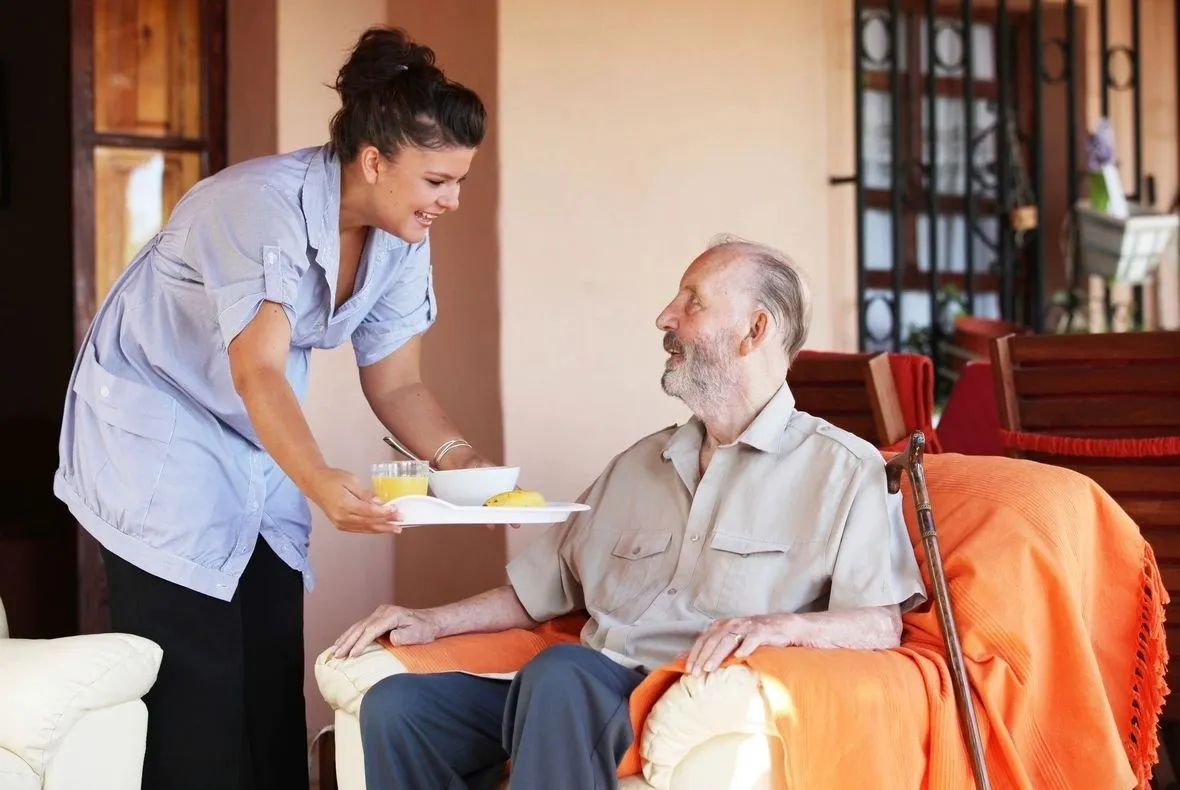
Exploring Long-Term Care Options: In-Home Care, Nursing Homes
January 25th, 2020aging in place, Alzheimer's Care, Caregiver Service, Dementia Care, Elderly Care, In Home Care, Long Term Care, Polish Care Services, Senior Care Services,
There are several options available to help those individuals in need of long-term care. Long term assistance care is a type of specialized care that involves providing comfort and care for individuals who are older or who are suffering from any type of disability or illness that does not allow them to properly care for themselves.
There are different kinds of long-term care, including institutional care, in-home care, nursing home care, adult day care, and assisted living care. Each individual has their own needs and each individual has their own set of challenges when it comes to providing long term care. These can include some that are based on physical conditions, others that are based on physical conditions or mental health concerns.
For those individuals who are in need of long-term care, there are many options available to help them. There are several types of long-term care available today. These include group homes, intermediate care facilities, personal care homes, and personal care agencies. With the help of these programs you can be able to choose what you need and make your own choices. Many individuals will choose to live in their own personal care home or community residential care facilities. As you research long term care options, you should remember that each situation is unique and that no two individuals are the same.
When considering long term care options, you must first decide if you want a facility, community residential care or personal care home. It is important to consider these options before choosing one. To do this, you should research the various options.
Some of the problems with long term care is that the costs of care can become a financial burden. This is due to the fact that the medical bills tend to be substantial for the individual in need of long-term care. There are often many bills associated with long term care, so it may be wise to know what you are looking at before deciding on a particular facility or plan.
Long term care can help the individual you are caring for by providing comfort and care. This may also include help with activities that the individual needs. When you are choosing long term care options, you must know what to expect in order to be sure that you are doing the right thing. When it comes to long term care, there are different types of choices. These are rehabilitation, which is used for individuals with physical and mental disabilities, the last type of long-term care is the nursing home care.
The rehabilitation type of long-term care is a very good option for individuals who are older and are in need of some type of physical activity. Rehabilitation is used for seniors who have lived a long life and are not physically fit. They need assistance to get more physical activity. The physical activity level of a senior is sometimes the determining factor in whether or not a patient is eligible for rehabilitation. Rehabilitation can also be used to help those who are young and who are in need of socialization and the emotional support of friends and family.
It is important to speak with your family member about their options. If there are any concerns, you should discuss with them before you make any decisions. You want to make sure that you will be able to provide all the care that they need when you decide to use long term care.
If you are looking for long term care solutions in Connecticut, there is no better place than Polish Care Services. Polish Care Services is located at 254 Main Street, Farmington, CT 06032 and can be reached by telephone at (860) 255-8278. Hours of operation are 9:00 am – 5:00 pm Monday – Friday and Saturday from 9:00 am – 2:00 pm. On Sundays the office is closed. The 24 hour line is available for emergency situations. Feel free to visit the website at https://polishcareservices.com/ to see the list of services. You will be happy that you did!

Three Reasons to Make a Long Term Care Plan
November 5th, 2019aging in place, Alzheimer's Care, Caregiver Service, Dementia Care, Elderly Care, In Home Care, Long Term Care, Senior Care Services,
Aging tends to sneak up on all of us. But that doesn’t mean you can’t make a plan for how to account for the care you or your loved one may need over the long-term. In fact, planning for long term care can help you maintain the lifestyle you’re used to. Here are three reasons why you or your loved one should create a long term care plan.
Long-Term Care Insurance Does Not Account for Everything
Many people obtain long-term care insurance as a way of planning for their long term care needs. And while it does have many benefits, you or your loved one should plan for what it does not cover such as:
· Who will be a caregiver?
· Will any family members who become caregivers need to leave or take an absence from their job?
· Who pays for expenses not covered by long term care insurance?
You Can Choose Where You Want to Be
Planning for your long term needs in advance means that you can choose whether you want to stay in your home. If maintaining your independence at home is a concern as you age, consider hiring an agency that provides in-home care services into your plan.
In home care agencies employ caregivers that help seniors maintain their independence at home by helping to cook and clean around the house, drive to appointments, and help with bathing and dressing. Even if you plan to have a family member be a caregiver, in home care providers may be able to help when a family member is unavailable.
Guard Against the Unexpected
Life has a way of throwing curveballs when we least expect them. When you plan for your own long term care or that of your loved ones, it helps make an unexpected hospitalization health challenge, or other concern a little easier to navigate. Often, unexpected events lead to disagreements among family members about what happens next. By making a long term care plan now, you will reduce the likelihood of disagreements and make sure the person in need of care gets what they want.
Planning for the future comes with its own challenges, especially where getting older is concerned. But making a plan for long term care including whether or not you need in home care is one way to make aging a fact rather than a challenge that seems insurmountable.
Polish Care Services provides trained and experienced caregivers to assist seniors in their home or care facilities. Call 860-255-8278 to see how our caregivers can assist you or your loved one. We accept various payment methods, including long-term insurance for live in or hourly care to assist seniors with in home care needs.

Polish Care Services Hartford’s Finest Series
September 27th, 2019aging in place, Alzheimer's Care, Caregiver Service, Dementia Care, In Home Care, Long Term Care, Polish Care Services, Senior Care Services,
Thank you for nominating and featuring Polish Care Services as part of the Hartford Courant and CTNow Hartford’s Finest series.
Polish Care Services is a a senior care agency in Farmington, Connecticut that provide caregivers for seniors in Connecticut.
The care team accepts longterm insurance, private pay, and Medicaid for live in and hourly services.


Senior Caregivers: Why You Should Look into Meditation and Yoga
December 20th, 2018aging in place, Alzheimer's Care, Caregiver Service, Dementia Care, Elderly Care, In Home Care, Long Term Care, Senior Care Services,
In 2015, an estimated 34.2 million Americans provided unpaid care to an adult age 50 or older. These senior caregivers provide daily meditation and yoga assistance to those who are either temporarily or permanently unable to function independently. Many informal caregivers move in with their senior loved one in an effort to support their decision to age in place.
Caregiving is a rewarding yet stressful endeavor. It is common for informal caregivers to add their new responsibilities on top of their day jobs. Furthermore, witnessing a loved one’s well-being deteriorate with time is mentally and emotionally taxing.
To help mitigate the anxiety, it’s important for caregivers to implement activities that help restore mental and physical health. Exercise is one of the best things people of all ages can do to care for their overall well-being. It supports a more positive mindset and relieves feelings of stress and anxiety. Regular exercise can even help relieve pain. Physical activity helps maintain bone health while regulating weight to mitigate pressure on joints and tendons. Exercise keeps the mind sharp and improves memory. Exercising during the day also expends energy for deeper, more restorative sleep at night. Senior caregivers can add more indoor exercises to their routines with the help of technology such as YouTube exercise instructionals, Nintendo Wii games, and fitness apps, but it’s important to break away from the screens from time to time. Joining a meditation and yoga community is the perfect way to do just that.
Meditation and Yoga for Seniors and Caregivers
Meditation and yoga go hand-in-hand. They both involve using mindfulness to connect our inner self with a higher energy; they both require practitioners to pay attention to the breath; they both attempt to clear away the restless energy we carry around by reaching for a point of stillness.
Yoga has the added benefit of being an accessible exercise for aging bodies. Many of the poses are performed in seated positions and can be modified for an individual’s physical needs. There is even chair yoga for those relegated to a mobility aid.
Yoga is therapeutic for both seniors and their caregivers. In addition to the regular benefits of exercise, the focus on the breath in yoga improves lung capacity and increases oxygen intake, which, in turn, helps cognitive function. The poses support a more stable core while enhancing both flexibility and mobility, improving overall balance and strength and reducing the risk of senior falls. The gentle exercise lowers cholesterol levels and blood pressure, which can help reverse cardiovascular disease when combined with other healthy habits.
An added benefit of joining a meditation and yoga community is the support and socialization. Both seniors and their caregivers need socialization for emotional and mental health. Socializing mitigates stress, reduces the risk of depression, builds self-esteem, and lengthens lifespan. Joining a meditation and yoga community plugs seniors and caregivers into a support system that is committed to compassion while providing the opportunity for the gentle exercise of both body and mind. Having an activity outside the home also keeps seniors and caregivers motivated while giving them something to look forward to in their routine.
There are millions of informal caregivers in the United States who help seniors perform their daily responsibilities for healthy living. An important part of maintaining both senior and caregiver health is exercise. Joining a meditation and yoga community is a great way to add more exercise to a routine while joining a group that is both supportive and compassionate. Being involved in a community help mitigate caregiver stress while enabling a longer and healthier life for seniors.
Credit: June Duncan for Polish Care Services https://polishcareservices.com


Healthy, Happy and Far Away: Advice for Long-Distance Caregivers
September 28th, 2018Alzheimer's Care, Caregiver Service, Dementia Care, Elderly Care, House Cleaning, In Home Care, Long Term Care, Senior Care Services,
If you live far away from an aging parent, you may have gone years without worrying about your father or mother getting to medical appointments, the grocery, or maintaining an active social life. However, with age may come a lack of mobility, forgetfulness, or isolation, and a once self-sufficient parent is suddenly incapable of doing all those things you’ve taken for granted. Seemingly overnight, you’ve become a long-distance caregiver with a very big job of coordinating a whole lot of needs and activities.
Now, you have to determine whether your loved one requires skilled medical care, assistance with daily activities, transportation to medical appointments, companionship, or in-home mobility modifications. It’s a lot to work out, and if the answer to one or more of these scenarios is “yes,” it’ll probably require a trip and a lot of research.
Medicare Supplement
Senior care can be very expensive. Adding a Medicare supplement plan is a good idea because it can help cover expenses that health insurance will not. Benefits may include anything from prescriptions to vision and dental care, based on the plan in which your parent is enrolled. Be aware that the Medicare open enrollment period begins October 15 and ends December 7, so the sooner you can help your parent research options, the better prepared you’ll be if the need arises.
Finding Support
This is an excellent time to enlist the aid of any friends or family members who live near your parent. If that’s not a possibility, consider introducing yourself to your parent’s neighbors in case an emergency intervention is necessary. Hopefully, the neighbors will be willing and able to help with transportation, errands, and other ad hoc needs that will likely arise. Find out as much as possible about in-home health aides, or check out the U.S. Department of Health and Human Services’ Carelike community resource finder, a free service that can help you identify services anywhere in the US (some senior care services are free and have no income requirements).
Caregiver Support Resources
Trying to carry on with so many new responsibilities can be overwhelming, especially when you live a long plane flight away. Your parent’s care needs could change at any time, so it’s important to know what to do if you have to find home care or companion services or a geriatric care manager. Do some research about local adult day cares, as well as assisted living and long-term care nursing facilities. Be prepared for the unexpected with a personal emergency response plan.
Monitoring
According to the National Institute on Aging, there are approximately 7 million long-distance caregivers in the US. If your parent has a special medical condition or is experiencing a mental or physical decline, a senior monitoring system provides the technology necessary to keep track of your parent and maintain peace of mind. Monitoring technology can keep you apprised of your parent’s health status, location, safety, and health. It can also keep medical care professionals apprised of the situation and increase response times if something goes wrong.
Emergencies
If an emergency does occur, you’ll need to have documentation that allows you to respond in a timely fashion. Also, make sure you have copies of your loved one’s medical records (don’t forget to include the names of doctors and other health care providers), proof of power of attorney, advanced medical directives, a living will, and anything you might need in case you have to travel on short notice.
If you’re a long-distance caregiver, information is a powerful asset because your parent’s care needs could change very quickly. Knowing where to turn in their community is essential because speed is of the essence when the need arises unexpectedly.
Credit: June Duncan for Polish Care Services https://polishcareservices.com


Helping Seniors During Seasonal Changes
September 17th, 2018Alzheimer's Care, Caregiver Service, Elderly Care, In Home Care, Long Term Care, Senior Care Services,
The seasonal changing is one of many challenges, seniors face as they progress in years. However caregivers, family members and community can offer support that helps gives seniors the right perspective to handle the transitions that occur four times each calendar year.
Transitioning into Winter
One of the primary effect on the elderly is the transition to winter. Some cause factors are:
• Loved ones visit and socializing becomes less frequent.
• Grandchildren have less time for grandma or grandpa, as they become more immersed in school activities.
• The weather becomes colder and more unpleasant.
• The weather creates more dangerous and stressful situations.
• Preparation and extra work is needed to keep the home safe and comfortable.
• Winter helps to trigger mood and health changes, and oftentimes exacerbates mental, health and physical conditions.
How Do We Help as the Seasons Change
Although all seasonal change may be challenging for seniors and their caregivers; the transition into winter is especially important to navigate with mindfulness and care.
Here are some of the things that can be done to assist your aging loved one to have an easier transition into the colder months of the year:
Discuss the Changes
We all know that the seasonal change is around the corner, and we all have feelings about it. Openly, discuss the seasonal change, and encourage talk about the challenges that are about to present themselves. This openness and acknowledgment can ease the transition considerably.
Help Prepare
Make sure warm clothing and extra blankets, are always around and that your loved one is prepared to handle the winter’s cold – make sure the house is insulated and winterized; create and use a checklist to ensure that nothing stands in the way of keeping the home comfortable during the winter months.
Inclusion
The winter can be a cold, lonely time, but it’s also a time when people get together more frequently to celebrate. Make sure your senior loved ones gets a chance to take part in the celebrations, too; although the weather is getting cold, the warmth of good company and celebration can make the most difficult winter days easier to endure.
More Help With the Changing Seasons
Learn more about how to help seniors through seasonal changes. Call Polish Care Services or visit https://polishcareservices.com today at 860-255-8278 for your FREE consultation!




Polish Care Services is now a My Place CT Partner.
September 10th, 2018Alzheimer's Care, Caregiver Service, Dementia Care, Elderly Care, Long Term Care, Senior Care Services,
As a My Place CT Partner, Polish Care Services will provide new opportunities for people to plan, find and manage in-home services and supports. By connecting local residents to what our Connecticut community has to offer, we help provide choices for people to live in the place they call home.
My Place CT is the state’s independent source of objective and well-vetted long-term services and supports information. It is a free resource to help older adults and people with disabilities live independently in the home or community. Making it easier to find care, services and supports—all in one place. Giving you the tools and information you need to find local, state and federal resources when you need them. Empowering you to live in the place you call home.
Polish Care Services also provide caregivers for the elderly and disabled so they can receive care and remain in their home. Please call 860-255-8278 or visit https://polishcareservices.com to see how we can assist you.


Self-Care Tips For Caregivers: How To Feel Better
August 17th, 2018Alzheimer's Care, Caregiver Service, Dementia Care, Elderly Care, House Cleaning, Janitorial Service, Long Term Care, Office Cleaning, Polish Care Services Trademark, Senior Care Services,
Self-care is incredibly important for all of us; it reduces stress and anxiety, helps with fatigue and health issues, and allows us to focus on our needs in order to heal emotionally, mentally, or physically. It can be difficult to carve time out of our busy schedules to do so, however, and when you’re a caregiver, looking after your own needs can bring on feelings of guilt. Caregivers often put themselves last on their list of priorities, and unfortunately, this can lead to burnout, exhaustion, and even substance abuse.
The good news is that taking care of yourself doesn’t have to be time consuming or lead to feelings of guilt or selfishness. Finding small ways to make yourself feel good and stay healthy is easy when you know where to begin, and usually, it starts at home. Create a relaxing space that will help you feel better after a long day and reduce stress, and set aside time to do things you enjoy, such as reading or gardening.
Keep reading for more great tips on how to practice self-care when you’re a caregiver.
Keep your finances in order
Many caregivers draw from their own finances to take care of a loved one, and it can be a huge drain on your savings to continue doing so, which can lead to stress and anxiety. Keep a close eye on your finances, set a budget for both of you, and look for ways you can save money by applying for grants for home modifications and medical equipment. Look online to see what you might qualify for; you can start here.
Take a time-out
Taking the time to get away from the stress you face every day is important, and it doesn’t require a vacation; you can take a little time-out whenever you feel overwhelmed simply by finding something that relaxes you and committing to it. Whether it’s a long, hot bath, sitting down with a cup of tea or coffee, or going out in the garden to putter for a few minutes, having a go-to stress reliever will help you feel in control and will allow you to combat emotional and mental fatigue.
Find healthy ways to cope
Many caregivers find that it’s difficult to deal with the stress of taking care of a loved one every day and turn to substances for a reprieve. It’s essential that you learn how to cope with those feelings of stress in a healthy way so that they don’t overwhelm you, because relying too much on alcohol or other dangerous substances will only lead to more issues. Find a support group so you can talk to people who understand what you’re going through, or consider taking up art therapy to help you release feelings of stress and tension.
Stay connected
Taking care of someone else’s needs for 24 hours a day can lead to feelings of isolation, so it’s imperative that you stay connected with your loved ones and friends. If you’re unable to go far, set up a Skype account so you can stay in touch with the people you enjoy spending time with, and make arrangements for video calls that will allow you to see them.
As a caregiver, you have a very large responsibility, and it can easily become overwhelming physically, mentally, and emotionally. Take care of yourself and make your health a priority; exercise daily to keep up your strength, and eat well-balanced meals. Learn how to focus on your own needs so you won’t suffer burnout.
Credit: June Duncan for Polish Care Services https://polishcareservices.com




Polish Care Services Trademark
July 22nd, 2018Alzheimer's Care, Caregiver Service, Dementia Care, Elderly Care, House Cleaning, Janitorial Service, Long Term Care, Office Cleaning, Polish Care Services Trademark, Senior Care Services,
Polish Care Services was grated the trademark from the United States Patent and Trademark Office (USPTO) for cleaning and caregiving services. As a company that genuinely cares about our clients and what we do, this is one more effort to let us stand out as a Polish European and American company that sets high standards not only in quality of work and care, but also customer service. Thank you to all our customers, employees and those who have supported us throughout the years.


Providing for Loved Ones: Tips and Advice for Caregivers
July 5th, 2018Alzheimer's Care, Caregiver Service, Dementia Care, Elderly Care, Long Term Care, Senior Care Services,
Approximately 43.5 million caregivers provided unpaid care to an adult or child in 2015, and roughly 34.2 million of those caregivers provided aid to someone 50 or older. Some caregivers provided care for their spouse, parents, or other family members, while others cared for a neighbor or long-time friend. Tasks can include providing transportation, shopping for groceries, cooking meals, assisting with bathing and grooming, cleaning, and more. Being a caregiver is both demanding and rewarding. It takes a lot of patience and preparation, but most caregivers (83 percent, to be exact) report a positive experience.
Home Modifications
Home modifications improve physical accessibility for people with disabilities and/or older adults who choose to age in place. They can also make it easier for caregivers to assist the older or disabled individuals. Some modifications are simple, such as installing grab bars in the bathroom. Other modifications require a bit more work but are still fairly simple, such as installing a ramp for the entry of the home. Modifications can also be costly and require professional installation, such as a stairlift, elevator, or walk-in bathtub.
Balancing Act
While caring for a family member or friend can be a rewarding experience that demonstrates love and commitment, it can also cause the caregiver to feel exhausted and worried. With continuous care demands and inadequate resources, the caregiver can feel extremely stressed. Caregivers are more likely to have a chronic illness than people who aren’t caregivers, and to make matters worse, they are less likely to practice preventive health care and self-care behaviors.
One of the most important parts of caring for someone else is to take care of yourself first. That may seem counterintuitive, but consider that when an oxygen mask descends in front of you on an airplane, the first rule is to put your own oxygen mask on before you assist anyone else. If you’re not healthy and well off, then you cannot properly care for others.
Managing stress in a healthy way is a good place to start. Instead of waiting until you’re completely overwhelmed, recognize the early warning signs of being overstressed, which include irritability, sleep problems, and forgetfulness.
Identify sources of stress, but remember you can only change yourself; you cannot change other people or their illnesses. Lastly, find a way to work through your stress, whether it’s through yoga, meditation, exercise, gardening, or just meeting a friend for coffee.
Assistance with Care
A common sentiment among caregivers is thinking or worrying that another person couldn’t care for their loved one as well as they can. But you don’t have to do everything yourself, and other people are capable of helping. Research agencies in your area and consider enlisting their home health help. You may also consider moving your loved one into an assisted living community.
“Assisted living facilities allow individuals to remain independent as long as possible in an environment that maximizes the person’s autonomy, dignity, privacy, and safety, as well as emphasizes family and community involvement,” says the National Caregivers Library. The individual has access to help 24 hours a day, if they need it, but they’re also able to perform many tasks on their own. The apartment-style accommodations have some safety modifications already in place, such as wider doorways and grab bars. Before moving day, ensure your loved one’s room has the proper modifications for his or her unique circumstances.
Moving day is stressful, packing and unpacking are taxing, and making such a big change is daunting. Hiring help for the move can alleviate some of these issues. Check out local movers to make the moving process as easy as possible. Professional movers will move all boxes and furniture, which means you don’t have to worry about the risk of injuring yourself or your loved one. Some also offer assistance with packing and unpacking, which eliminates even more stress. Call several professionals in your area to compare moving costs for each company.
Although you’ll feel emotionally overwhelmed and physically exhausted at times, knowing that you’re helping someone else live a better life is gratifying. You can feel a sense of giving back to someone who has cared for you previously, such as a parent. Whether you provide the care or find assistance providing care, you’ll feel satisfaction in knowing that your loved one is getting excellent care.
Credit: June Duncan for Polish Care Services https://polishcareservices.com
